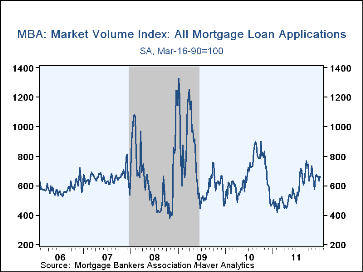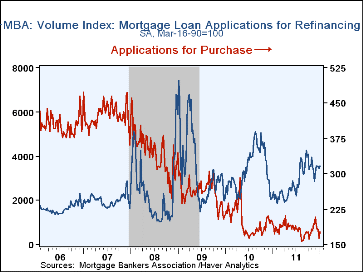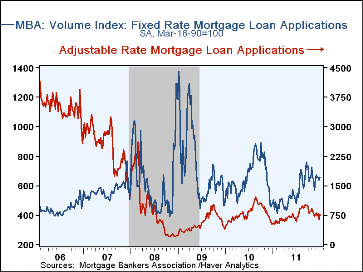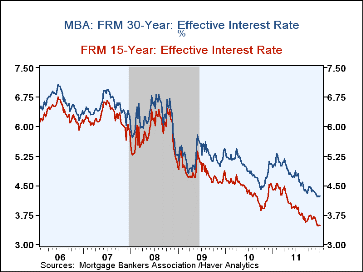 Global| Jan 11 2012
Global| Jan 11 2012U.S. Mortgage Applications & Interest Rates Trend Sideways
by:Tom Moeller
|in:Economy in Brief
Summary
The index of total mortgage applications rose 4.5% last week to 663.1 (March 16, 1990 = 100). The increase followed the prior week's 4.1% decline and the index has moved irregularly sideways since October. Applications to refinance [...]
The index of total mortgage applications rose 4.5% last week to 663.1 (March 16, 1990 = 100). The increase followed the prior week's 4.1% decline and the index has moved irregularly sideways since October. Applications to refinance rose 3.3% (60.4% y/y) and made up a 2.5% decline during the prior week. They remained up by two-thirds y/y. Applications to purchase a home rose 8.1% and made up most of the prior week's decline. Despite the weekly gain, applications remain off by two-thirds from the 2005 high. As borrowers seek to lock in low financing costs, applications for fixed-rate loan financing have risen sharply since the Spring. Applications for variable rate mortgages moved sideways.
The effective rate on fixed-interest, conventional 15-year mortgages held at its prior low of 3.49%. The effective rate on a 30-year fixed rate loan also was constant at 4.23%. On a 30-year Jumbo the effective rate fell to a new low of 4.47%. Though it's narrowed slightly of late, the spread between 15- and 30-year loan rates continued wide by historical standards. The effective interest rate on an adjustable 5-year mortgage fell to 3.08% from 3.14% averaged during December.
The Mortgage Bankers Association surveys between 20 to 35 of the top lenders in the U.S. housing industry to derive its refinance, purchase and market indexes. The weekly survey covers roughly 50% of all U.S. residential mortgage applications processed each week by mortgage banks, commercial banks and thrifts. The figures for weekly mortgage applications are available in Haver's SURVEYW database.
(1/11)
Tom Moeller
AuthorMore in Author Profile »Prior to joining Haver Analytics in 2000, Mr. Moeller worked as the Economist at Chancellor Capital Management from 1985 to 1999. There, he developed comprehensive economic forecasts and interpreted economic data for equity and fixed income portfolio managers. Also at Chancellor, Mr. Moeller worked as an equity analyst and was responsible for researching and rating companies in the economically sensitive automobile and housing industries for investment in Chancellor’s equity portfolio. Prior to joining Chancellor, Mr. Moeller was an Economist at Citibank from 1979 to 1984. He also analyzed pricing behavior in the metals industry for the Council on Wage and Price Stability in Washington, D.C. In 1999, Mr. Moeller received the award for most accurate forecast from the Forecasters' Club of New York. From 1990 to 1992 he was President of the New York Association for Business Economists. Mr. Moeller earned an M.B.A. in Finance from Fordham University, where he graduated in 1987. He holds a Bachelor of Arts in Economics from George Washington University.
More Economy in Brief
 Global| Feb 05 2026
Global| Feb 05 2026Charts of the Week: Balanced Policy, Resilient Data and AI Narratives
by:Andrew Cates










